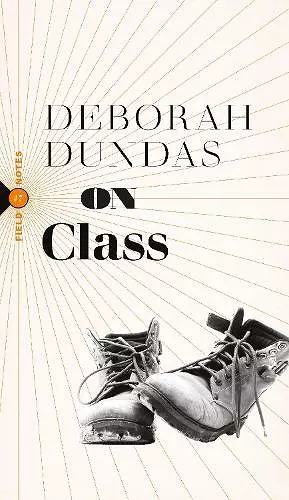On Class
Format:Paperback
Publisher:Biblioasis
Published:18th Jan '24
Should be back in stock very soon

Shortlisted for the 2024 Speaker's Book Award • Nominated for the 2024 Heritage Toronto Book Award • A Hamilton Review of Books Best Book of 2023
Deborah Dundas is a journalist who grew up poor and almost didn’t make it to university. In On Class, she talks to writers, activists, those who work with the poor and those who are poor about what happens when we don’t talk about poverty or class—and what will happen when we do.
Growing up poor, Deborah Dundas knew what it meant to want, to be hungry, and to long for social and economic dignity; she understood the crushing weight of having nothing much expected of you. But even after overcoming many of the usual barriers faced by lower- and working-class people, she still felt anxious about her place, and even in relatively safe spaces reluctant to broach the subject of class. While new social movements have generated open conversation about gender and racism, discussions of class rarely include the voices of those most deeply affected: the working class and poor.
On Class is an exploration of the ways in which we talk about class: of who tells the stories, and who doesn’t, which ones tend to be repeated most often, and why this has to change. It asks the question: What don’t we talk about when we don’t talk about class? And what might happen if, finally, we did?
Praise for On Class
"The author uses her own experience of growing up poor to thread interviews with writers and activists about the barriers to success in Canada’s widening class divide."
—Globe and Mail
"On Class is urgent and wise, written with Dundas' trademark wit and crisp prose. Raw and smart, it urges readers not to look away from the complexity of issues affecting the poor and working class, especially in a time of constant political, economic, and social turmoil."
—Open Book
"A nifty, provocative little book."
—Winnipeg Free Press
“On Class is a great read, perfect for readers less familiar with the notion of class and what it really means, but also interesting and thoughtful enough for those who have already begun to engage with the topic. Dundas pulls a lot of threads together in this volume, but it works really well and serves as an excellent, broad starting point.”
—The Miramichi Reader
"Coming at the complex issue of class from several angles, Deborah Dundas draws from personal narrative, interviews and testimonies, formal research and studies, information from media, and other sources to present a holistic, nuanced and highly informative view of class in Canada."
—Montreal Serai
"On Class might be a quick read, but it is definitely an important one."
—The Quarantine Review
"I really enjoyed Deborah Dundas’s small and brave book On Class. She addresses the need to speak about the different classes in Canada, and the ways it is almost impossible to cross their divides."
—Heather O'Neill, author of When We Lost Our Heads
"[Dundas] shares her own experience of growing up poor and facing class-driven barriers to success."
—Zoomer
"Why does our society put so much emphasis on individual achievements and pay so little attention to collective ones? On Class doesn’t offer answers to these critical issues and questions—a task beyond any one volume—but it does offer a pleasing invitation to reflect upon them."
—Monitor
Praise for the Field Notes series
“A clear-eyed assessment of the links between property, policing, and the subjugation of Black people ... Walcott’s analysis of the ways in which white supremacy is baked into the legal systems of Canada and the U.S. is stimulating. Progressives will embrace this well-conceived call for change.”
—Publishers Weekly
“Running a brief but far-reaching and punchy 96 pages, On Property has an absolute certainty of purpose: calling for the abolition of private property ownership ... [If] statements such as ‘the problem of property is resolved through its removal’ or calls to ‘abolish everything’ can make some people quake, when Walcott’s pamphlet argues for the human ability to reconsider and rebuild societal structures, the stances come across as sensible and, better yet, doable.”
—Toronto Star
"Rinaldo Walcott locates his contribution to the Field Notes series on current issues, On Property, in the present political moment, while using historical references and events to argue for the abolition of police and property ... Walcott concludes his case by asking for a new ethics of care and economy that does not keep feeding into the incarceration system, a system rigged to continue Black suffering ... It is a question we must ask ourselves after reflecting on the ways in which we, too, are complicit."
—Quill & Quire
"Kingwell offers a slender, thoughtful, sometimes meandering disquisition on risk that “is inflected (or infected) by the virus, but not precisely about the virus—except as it grants new urgency to old questions of risk and politics. A host of cultural allusions—from Shakespeare to the Simpsons, Isaiah Berlin to Irving Berlin, Voltaire, Pascal, and Derrida—along with salient academic studies inspire Kingwell to examine the many contradictory ways that humans handle risk ... An entertaining gloss on an enduring conundrum."
—Kirkus Reviews
“Urgent, far-reaching and with a profound generosity of care, the wisdom in On Property is absolute. We cannot afford to ignore or defer its teachings. Now is the time for us-collectively-to take up the challenge in this undeniable gift of a book.”
—Canisia Lubrin, author of The Dyzgraphxst and Voodoo Hypothesis
- Short-listed for Speaker's Book Award 2024 (Canada)
- Nominated for Heritage Toronto Book Award 2024 (Canada)
ISBN: 9781771964814
Dimensions: unknown
Weight: unknown
128 pages